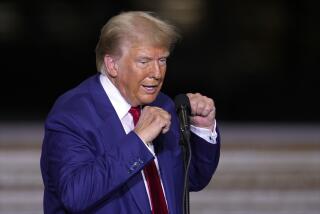Prosecutors Criticize McVeigh Stay Request
- Share via
DENVER — Following Atty. Gen. John Ashcroft’s vow to vigorously oppose more delays, federal prosecutors said Monday that Oklahoma City bomber Timothy J. McVeigh is merely trying to put the government “on trial” by asking for another stay of his execution, now set for Monday.
The government, responding in U.S. District Court here to McVeigh’s request, also said it was “absurd” that McVeigh should escape execution after he recently confessed that he alone delivered the bomb and that no one other than his collaborator, Terry L. Nichols, assisted him.
“Rather than answer for his own proven and admitted murderous conduct, McVeigh would like to put the federal government on trial,” Sean Connelly, a special government prosecutor, said in his court papers.
In a scathing rebuttal to McVeigh’s continuing self-avowed hatred of the government, Connelly added:
“No one, much less an ‘enemy of the Constitution,’ is entitled to use the federal courts to advance his personal agenda--regardless of whether that agenda is to ‘promote integrity in the court system’ as his lawyers characterize it or to continue a self-declared war against the government.”
With the government’s official response now on file, the stage is set for a dramatic confrontation Wednesday before U.S. District Judge Richard P. Matsch.
McVeigh is scheduled to die Monday at the federal prison in Terre Haute, Ind., and Matsch must decide whether to postpone that date. The more fundamental legal question before the judge is whether the government denied McVeigh a fair trial by reneging on its pretrial promise to share all investigative files with his defense lawyers.
The 33-year-old McVeigh would have been dead for nearly three weeks. But his first execution date, May 16, was abruptly scrapped when federal prosecutors had to report the belated discovery of more than 4,000 pages of FBI files from the case.
The sudden developments prompted Ashcroft to set the new date of this Monday. But that schedule was thrown into doubt last week when McVeigh, saying through lawyers that he wanted to “promote integrity in the criminal justice system,” had his attorneys request a stay of execution so that they would have time to examine the new documents.
McVeigh’s lawyers charged that the government had perpetrated a “fraud upon the court” by failing to share all its files with the defense, and they alleged that additional documents still were being withheld.
According to the government, however, all of the new files now have been turned over. And, Connelly insisted in his filing here, nothing new comes close to changing the jury verdict that McVeigh is guilty of and should die for the April 19, 1995, explosion that killed 168 people and injured more than 500 others at the Alfred P. Murrah Federal Building.
Connelly also sought to knock down an effort by defense lawyers to suggest that at least nine of the recently discovered files offered promising new information that the jury should have been told about in McVeigh’s trial.
However, none of that information has been released publicly because Matsch has placed a protective order on all of the material.
Connelly said that the nine new documents totaled a “little more than 20 pages” of material.
“We analyze each of these documents in a separate pleading [filed under seal], and attach 53 exhibits to that sealed pleading showing that the same or similar information was disclosed prior to trial,” Connelly said.
In a broader context, the government argued that McVeigh’s execution should go forward because of statements he has made in recent months. In a new book, he reportedly confessed to the truck bombing--the worst mass murder in America--and in a recent letter to the Houston Chronicle he said that there was no “John Doe No. 2.”
The John Doe No. 2 character was reportedly seen with McVeigh before the bombing at a Ryder rental truck agency in Kansas, but the government has since determined that the shop employees were innocently mistaken and that McVeigh alone rented the vehicle.
“Timothy McVeigh does not, and could not, suggest that he is actually innocent of the charges of which the jury convicted him,” Connelly said. “He does not, and could not, suggest that the death penalty is unwarranted for his exceptionally aggravated crimes.”
To make his point, the prosecutor listed 10 pieces of testimony or evidence from the trial that he said proved McVeigh’s guilt. They included that McVeigh had told others of his bomb plans; that his fingerprint was on a receipt for a purchase of ammonium nitrate, a key ingredient in the bomb; and that found in his car on the day of the bombing were writings explaining the “value of the attacks today.”
In a separate development Monday, the U.S. Supreme Court in Washington delayed a ruling on Nichols’ request for a new trial because of the controversy over the recently disclosed FBI files.
The high court said the government must first respond to Nichols’ allegation that he, like McVeigh, should have had the benefit of reviewing all of the FBI files before he was convicted in a separate trial in 1997 and sentenced to life in prison with no parole.
More to Read
Sign up for Essential California
The most important California stories and recommendations in your inbox every morning.
You may occasionally receive promotional content from the Los Angeles Times.














